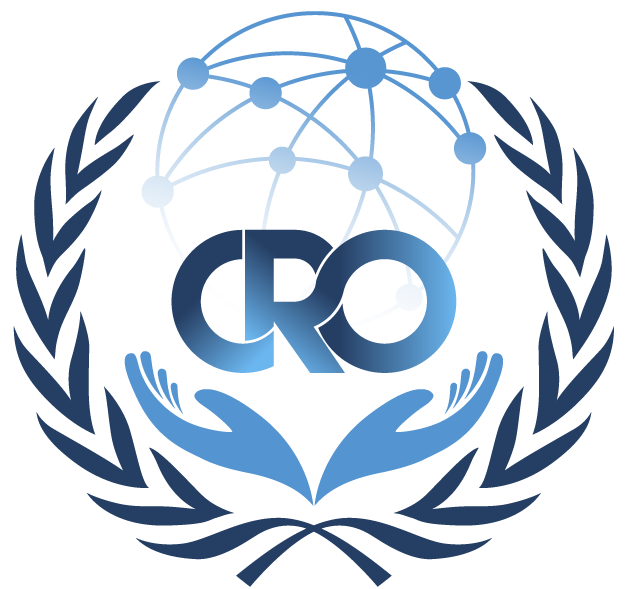Learn about the fundamental human rights that every person is entitled to and their importance in this comprehensive guide.
Index
- What are human rights?
- Historical evolution of human rights
- The role of governments in upholding human rights
- The responsibility of individuals and communities in defending human rights
- Different forms of human rights activism
- The growing impact of human rights across the globe
- Conclusions

Has someone posted private material online without your permission?
Request immediate assistance
What are human rights?
Human rights are a philosophical and political concept which, taken as a juridical basis by modern constitutions, describes the inalienable rights that every person possesses.
CRO Cyber Rights Organization’s mission to create a world where digital rights are respected and protected according to the principles of the European Declaration on Digital Rights.
Fundamental human rights include rights to:
- Life;
- Individual freedom;
- Self-determination;
- Fair trial;
- Dignified existence;
- Religious freedom;
- Vote.
Recently, the right to the protection of personal data has been added.
The text that safeguards human rights is the Universal Declaration of Human Rights (UDHR):
“The UDHR is widely recognized as having inspired, and paved the way for the adoption of more than seventy human rights treaties, applied today on a permanent basis at global and regional levels”.
It is a milestone adopted by the United Nations General Assembly at its third session on the 10th of December 1948 in Paris.
Today the UN has 192 member states: all of them have signed on in agreement with the Universal Declaration.
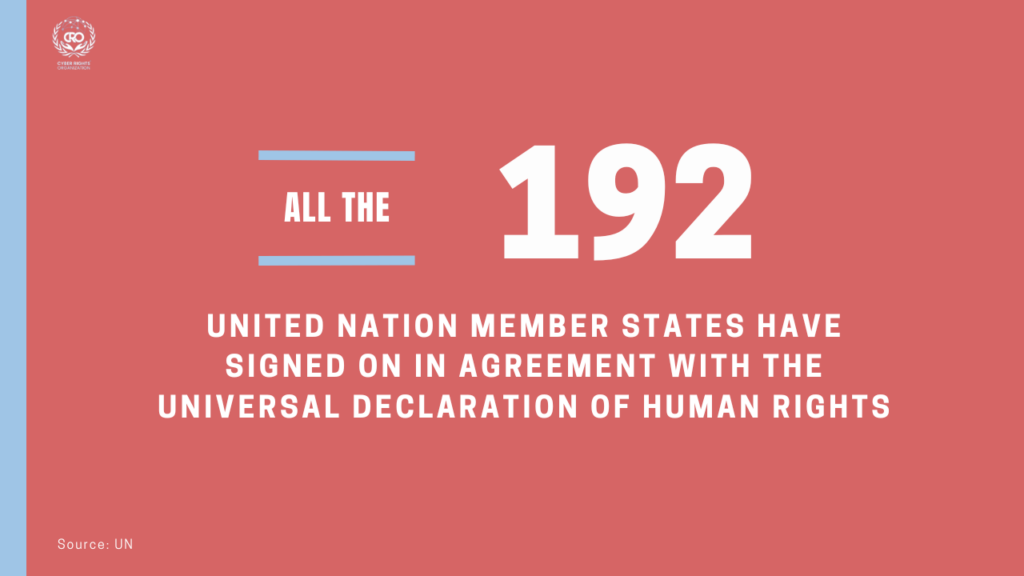
Specifically speaking, human rights intrinsically belong to every individual on earth, regardless of nationality, sex, ethnic origin, color, religion, language or any other status.
The importance therefore of the Universal Declaration is precisely that of continuing to be the foundation of all international human rights law.
Its 30 articles provide the principles and building blocks of current and future human rights conventions, treaties and other legal instruments.
Digital human rights
Another significant step in the area of human rights was taken in 2022 by the EU with the Declaration of Digital Rights and Principles.
In the preamble to the Declaration you can read the purpose of this important document:
“We aim to promote a European way for the digital transition, putting people at the centre. It shall be based on European values and benefiting all individuals and businesses”.
The draft Digital Rights and Principles Declaration aims to give everyone a clear reference on how Europe promotes and defends digital transformation.
Indeed, it outlines key rights and principles for the digital transformation, including putting people and their rights first, promoting solidarity and inclusion, ensuring freedom of choice online.
Finally, it is still important to talk about Human Rights and raise awareness because in the world, they are not yet respected in many contexts.
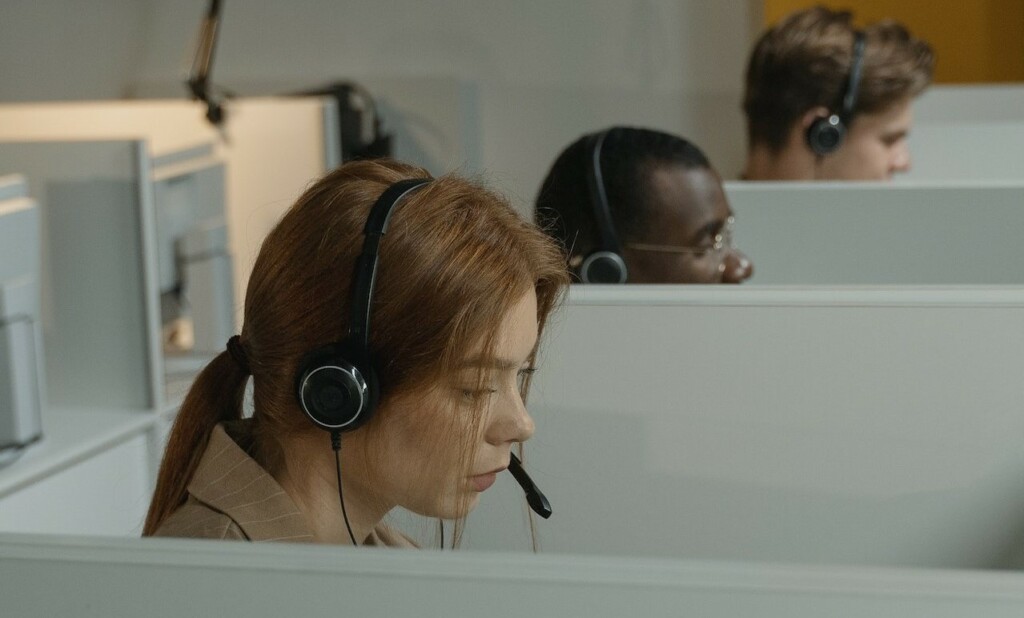
Are you a victim of online crime or abuse?
Contact the CRO Helpline
Historical evolution of human rights
It is difficult to identify precisely the historical moment when the concept of human rights emerged.
Nevertheless, here are some important moments that have marked the history:
- Congress of Vienna of 1815 where it was promote the abolition of the slave trade;
- Brussels Convention in 1890, when this purpose was finally achieved;
- The adoption, in 1948, by the United Nations of the UDHR;
- International Covenant on Civil and Political Rights and the International Covenant on Economic, Social and Cultural Rights, both of which came into force in 1976;
- European Declaration on Digital Rights and Principles for the Digital Decade adopted in January 2022.
However, it can be assumed that during the modern Era, the idea began to make space under the concept of “Natural Rights”.
Philosophers such as John Locke, Thomas Hobbes and Hugo Grotius identified natural rights in the sense that they were fundamental to the human being and at the core of their inherent nature.
In that sense, they marked deeply the future conceptualization.
The universal declaration of human rights
“Whereas recognition of the inherent dignity and of the equal and inalienable rights of all members of the human family is the foundation of freedom, justice and peace in the world.”
This is the beginning of the Preamble to the Universal Declaration of Human Rights.
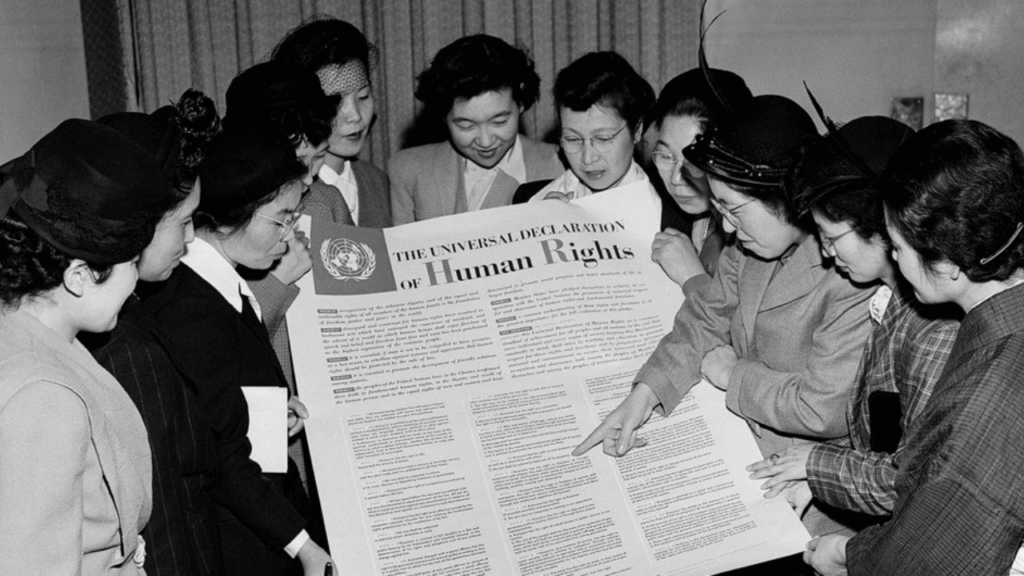
It is an historic document that outlines the rights and freedoms to which every human being is entitled.
It was the first international agreement on the fundamental principles of human rights: it laid the groundwork for the Human Rights we enjoy as citizens worldwide, which are protected and enforced by the United Nations.
The first five articles of the UDHR are a pillar in the history:
- 1 Article: all human beings are born free and equal and should be treated the same way;
- 2 Article: everyone is entitled to all the rights and freedoms set forth in this Declaration, without distinction of any kind, such as race, colour, sex, language, religion, political or other opinion, national or social origin, property, birth or other status;
- 3 Article: everyone has the right to life, liberty and the security of person;
- 4 Article: no one shall be held in slavery or servitude; slavery and the slave trade shall be prohibited in all their forms;
- 5 Article: no one shall be subjected to torture or to cruel, inhuman or degrading treatment or punishment.
The dramatic events of World War II demonstrated that those rights were not always universally respected.
For this reason, soon after the conflict, governments around the world made a concerted effort to encourage international peace and prevent conflicts.
The role of governments in upholding human rights
Considering the state of rights in the world today, we realize that much still needs to be done to ensure that human rights are guaranteed.
Let’s look at those following data by the collective DoSomething.org:
- 40 million children below the age of 15 suffer from abuse and neglect;
- There are approximately 246 million child laborers worldwide proving childhood is in danger;
- Approximately 27 million people are currently enslaved in the human trafficking trade around the world.
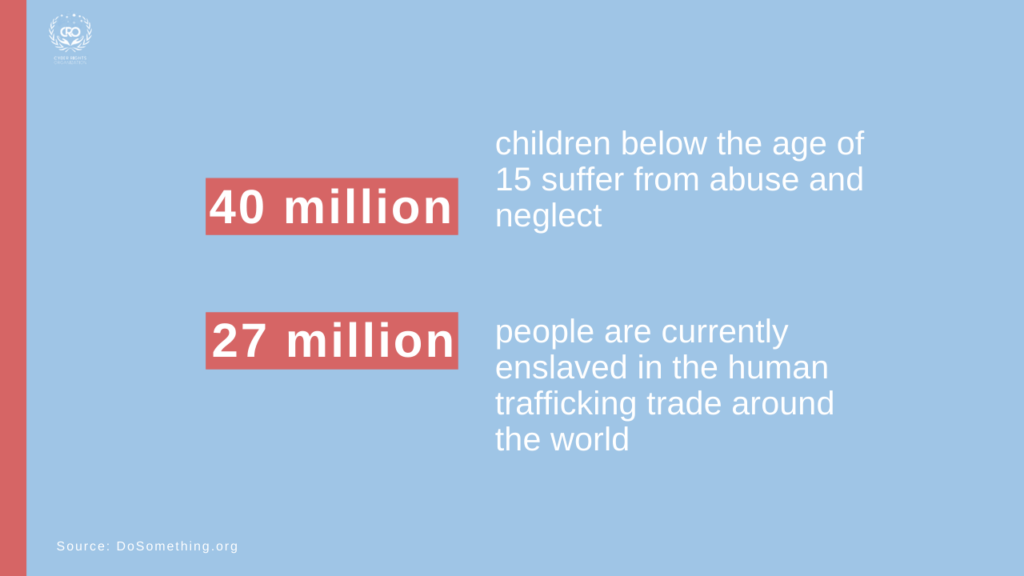
Indeed, the primary focus for the promotion and protection of human rights is at the national level.
And it is therefore the primary responsibility of States to ensure that these rights are promoted, protected and fulfilled.
That is why the governance of states must be deeply linked to their promotion and protection.
According to the OHCHR:
“Good governance and human rights are mutually reinforcing. Human rights standards and principles provide a set of values to guide the work of governments and other political and social actors.
They also provide a set of performance standards against which these actors can be held accountable. Moreover, human rights principles inform the content of good governance efforts: they may inform the development of legislative frameworks, policies, programmes, budgetary allocations and other measures”.
And that is why, on the other hand, without optimal governance, human rights cannot be respected and supported.
Governments also have the task of protecting the identity and freedoms of citizens on the internet era.
In these terms, the need to implement online protection against explicit and implicit forms of digital violence against people relied on the role of legislators.
The responsibility of individuals and communities in defending human rights
Since human rights are inalienable in all their assumptions, even the individual is subject to respect for the people in the forms and meanings found in the Universal Declaration.
For instance, every state is responsible for protecting its people from genocide, war crimes, ethnic cleansing and crimes against humanity.
Such responsibility shall involve the prevention of any kind of crimes, including cyber crimes like sextortion.
As for the State, the citizen also has the right and the duty to align himself with this way of understanding the rights of persons and virtuously promoting respect for Human Rights.
Each individual citizen is entitled to contribute actively, freely and with meaningful participation, to the enjoyment of civil, political, economic, social and cultural development, through which rights and fundamental freedoms can be realized.
In this context and with the same vision of ethics purposes, the CRO Cyber Rights Organization wants them to be respected in the digital world.

Want to report a case of digital rights infringement?
Contact the CRO Helpline
Different forms of human rights activism
Human rights activism takes many forms.
To this respect, any action that demands change and accountability counts.
Here are some of the most important examples.
Petition and letter writing
Amnesty International, for example, runs Write For Rights, a letter-writing campaign that has been running for two decades.
Every December, people write letters, emails, postcards, tweets and Facebook posts in support of human rights defenders, prisoners and others.
Strikes and boycotts
Throughout history, boycotts and strikes have been the most effective and solid forms of activism.
Very often, the two go in tandem.
Consider that not necessarily the strike is addressed in the corporate context, but also to bring out fundamental issues for society.
Think about the movement for the right to vote for women and, today, strikes to raise political and societal awareness of the challenge of climate change.
Protests and marches
Associations, activists for the rights of people, NGOs, people united by an ideal, gather at a place to raise public awareness.
Think that the right to gather and freely manifest one’s own thought it’s included in the United Nations Declaration.
Articles 19 and 20 protect the right to assemble in public and to express, promote and defend beliefs.
The growing impact of human rights across the globe
By reading Eleanor Roosevelt’s prescient speech, it may be easier to fully understand the value and application of human rights and, today, digital rights:
“Where, after all, do universal human rights begin? In small places, close to home – so close and so small that they cannot be seen on any maps of the world. Yet they are the world of the individual person; the neighborhood he lives in; the school or college he attends; the factory, farm, or office where he works.”
The Declaration has been the catalyst for other important treaties against discrimination on the basis of race, sex and disability, as shown by those example of the Auckland University:
- 198 countries allow women to vote, up from 91 in 1948;
- 57% of countries have a human rights institution;
- 111 countries have passed laws to protect freedom of the press.

Moreover, as the UN recalls, these rights need to be at the center of government agendas to continue impacting the lives of the world’s population.
In addition, the increasing interpenetration between real life and the online life calls for a thorough assessment of the protection of digital rights.
How do human rights impact our lives?
Human rights are basic rights that belong to all of us simply because we are individuals.
Nowadays, it also includes anything that happens online.
As explained above, they are the embodiment of key values in our society, such as fairness, dignity, equality and respect.
For all of us, especially those who may be at risk of abuse, neglect and isolation, they are an important means of protection.
It means that digital rights are human rights and it is fundamental to protect people from threats like catfishing.
Most of all, these rights give us power and enable us to raise our voices and contest mistreatment by authorities.
The way in which our lives are impacted is expressed above all in the constitutions of the states adhering to the Universal Declaration that over the decades have structured laws, programs of support, policies inspired by the UDHR.
Indeed, every human being needs access to health care, food and water, clothing, and shelter.
Through the inclusion of these as part of a person’s basic rights, every person has a basic level of dignity.
When people experience abuse and corruption, the concept of human rights allows them to speak out.
They empower people, telling them they deserve dignity from society, whether it’s the government or their workplace.
Human Rights impact our lives from the point of view of the dignity of work; the right to health and education; gender equality; the right to express our opinion without encountering any kind of harassment; as well as the right to live in a protected and unpolluted environment because of the profit of a few.
Ultimately, there are many perspectives that allow citizens’ lives to benefit from the Universal Declaration.
Conclusions
Human rights are the basic rights that form the essential part of people’s development as individuals.
You can draw the following conclusions reading our guide:
- Human rights are a philosophical and political concept which, taken as a juridical basis by modern constitutions, describes the inalienable rights that every person possesses;
- All the 192 member states have signed on in agreement with the Universal Declaration of Human Rights;
- The Universal Declaration, signed on 10 December 1948, is an historic document that outlines the rights and freedoms to which every person is entitled;
- The most important obligation for citizens is not to do anything that violates the freedoms enshrined in the Universal Declaration;
- The draft Digital Rights and Principles Declaration aims to give everyone a clear reference on how Europe promotes and defends digital transformation;
- Human Rights impact our lives from the point of view of the dignity of work, the right to health and education, gender equality, the right to express our opinion without encountering any kind of harassment.
The CRO Cyber Rights Organization is fighting every day to ensure that those rights are respected everywhere.
We believe that every person on earth must see their freedoms protected.
We provide legal and technical assistance to all survivors who have experienced violations of their rights online.
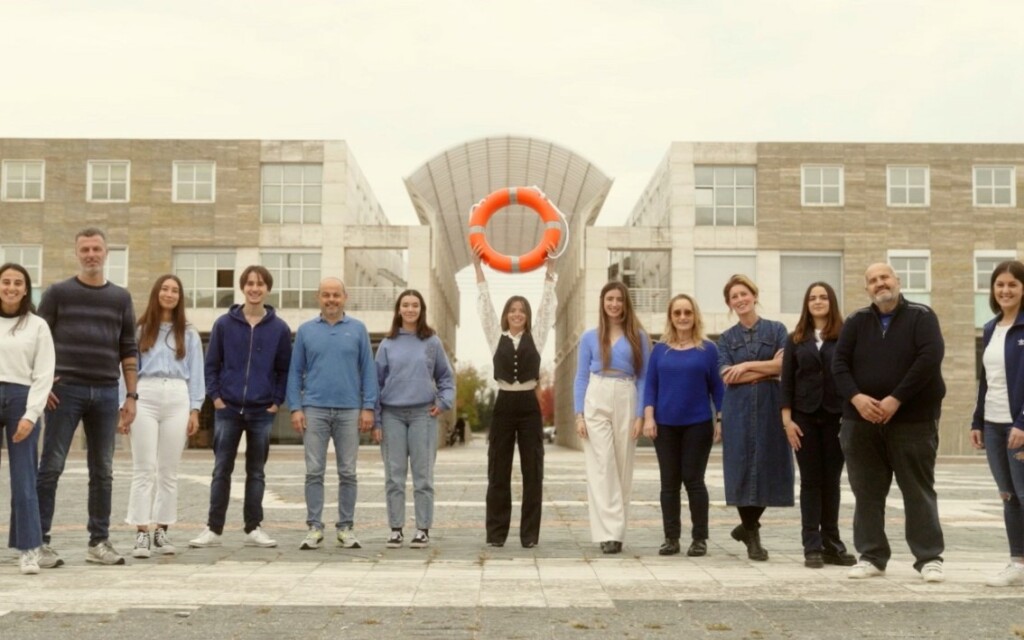
Need help removing harmful or illegal content from the Internet?
Request immediate assistance


